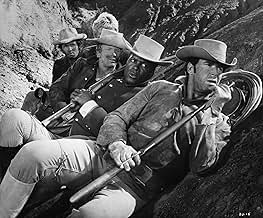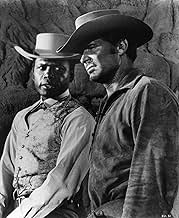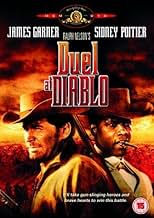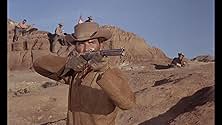CALIFICACIÓN DE IMDb
6.5/10
4.7 k
TU CALIFICACIÓN
En territorio apache, un hombre busca al asesino de su mujer india y una ama de casa abandona a su marido, para unirse a la tribu de su amante apache.En territorio apache, un hombre busca al asesino de su mujer india y una ama de casa abandona a su marido, para unirse a la tribu de su amante apache.En territorio apache, un hombre busca al asesino de su mujer india y una ama de casa abandona a su marido, para unirse a la tribu de su amante apache.
- Dirección
- Guionistas
- Elenco
- Premios
- 1 nominación en total
Ralph Nelson
- Col. Foster
- (as Alf Elson)
Armand Alzamora
- Ramirez
- (sin créditos)
Ralph Bahnsen
- Trooper Nyles
- (sin créditos)
Timothy Carey
- Deputy Clem
- (sin créditos)
Jeff Cooper
- Trooper Casey
- (sin créditos)
Kevin Coughlin
- Norton
- (sin créditos)
Robert Crawford Jr.
- Trooper Swenson - Bugler
- (sin créditos)
Opiniones destacadas
James Garner is a good lead in this rousing Cavalry v. Indians western. There are very good battle scenes between between the outnumbered soldiers and the attacking Indians. The underlying issues of prejudice add an interesting touch to the movie as well with James Garner's character struggling with the death of his Indian wife and the Bibi Andersson character struggling with raising her baby fathered by an Indian brave.
As in any good western, the scenery also plays an important part and the southern Utah settings are particularly striking. The musical soundtrack is a little off-beat for a western, but also very good. Dennis Weaver, Sidney Poitier, and Bill Travers all add to the movie with good supporting performances.
As in any good western, the scenery also plays an important part and the southern Utah settings are particularly striking. The musical soundtrack is a little off-beat for a western, but also very good. Dennis Weaver, Sidney Poitier, and Bill Travers all add to the movie with good supporting performances.
What terrific production values—that trek across a hellishly barren Utah desert had me off the couch, running for a water pitcher. And catch all those cavalrymen, Indians, and wild horses, enough for at least ten more westerns. Then there's the great James Garner to headline, along with a spiffy Sidney Poitier. So, why isn't this a top-notch horse opera, given such promising prospects.
For one thing, there's about ten sub-plots too many. Heck, just the ordeal across the desert should be enough for most westerns without over-crowding the storyline. Sure, the script is making a good point about racism with Ellen's half-Indian baby. But do we need the soap opera sub-plot with husband Dennis Weaver that's mainly a distraction. Then there's Poitier showing it wasn't just white guys who won the west. And, of course, the screenplay has to carve out a large enough role for a second headliner. Add to that Garner's search for whoever scalped his wife that is sort of tacked on at the end, and we've got enough plot material for three more features.
Sure, the movie's heart is in the right place. But messages are one thing, while merging them into a fluid narrative is another, and here the sub-plots add to the general problem of too much storyline clutter. The root of the problem, I expect, was hiring too many name stars, even if Travers and Andersson are known mainly to foreign audiences. Speaking of the cast, Garner's unusual skills are largely wasted in a role any number of imposing presences like Clint Walker could have easily handled.
And I never thought it would happen, but by about the twentieth skirmish across the desert, I actually got a little bored with all the repetitive stunts and endless shooting. 'More', it seems, is not always better, and I suspect the lesson is there can be too much action even in an action movie.
Anyway, I don't want to simply dismiss the movie because of its excesses since there are also a number of good touches (Chata gets some respect as a leader of his people, even though we see him as cruel), along with the generous production values. I'm just sorry the movie doesn't succeed better given its praiseworthy side.
For one thing, there's about ten sub-plots too many. Heck, just the ordeal across the desert should be enough for most westerns without over-crowding the storyline. Sure, the script is making a good point about racism with Ellen's half-Indian baby. But do we need the soap opera sub-plot with husband Dennis Weaver that's mainly a distraction. Then there's Poitier showing it wasn't just white guys who won the west. And, of course, the screenplay has to carve out a large enough role for a second headliner. Add to that Garner's search for whoever scalped his wife that is sort of tacked on at the end, and we've got enough plot material for three more features.
Sure, the movie's heart is in the right place. But messages are one thing, while merging them into a fluid narrative is another, and here the sub-plots add to the general problem of too much storyline clutter. The root of the problem, I expect, was hiring too many name stars, even if Travers and Andersson are known mainly to foreign audiences. Speaking of the cast, Garner's unusual skills are largely wasted in a role any number of imposing presences like Clint Walker could have easily handled.
And I never thought it would happen, but by about the twentieth skirmish across the desert, I actually got a little bored with all the repetitive stunts and endless shooting. 'More', it seems, is not always better, and I suspect the lesson is there can be too much action even in an action movie.
Anyway, I don't want to simply dismiss the movie because of its excesses since there are also a number of good touches (Chata gets some respect as a leader of his people, even though we see him as cruel), along with the generous production values. I'm just sorry the movie doesn't succeed better given its praiseworthy side.
"Duel at Diablo" filmed in 1966, has a cast of both American and international players and touches of violence coupled with prejudices. It makes for an interesting mix and provides the viewer with a tense depiction of the usual struggles of the Apaches against the US Cavalry. James Garner plays Jess Remsberg, an Indian scout now out looking for the man or men that raped and killed his Indian wife. Sidney Poitier adds an excellent portrayal of a former Army sergeant who has quit the job of soldering in exchange for breaking horses, and selling them to the Army. Bill Travers and Bibi Anderson provide the international flavor in the cast, and Dennis Weaver gives the viewer a chance both to detest him and feel some sorrow for his warped prejudices toward those he considers inferior or below his status.
The group of troopers heads out across the desert to another fort in the area, but are headed off by a group of Apaches that have jumped their reservation. Garner does find out the identity of the man who was responsible for the rape/killing of his Indian wife, but in order to extract his revenge, he must first make it to the canyon of Diablo and rescue the beseiged group of Army troopers from being killed by the Apaches.
Good, tense story, sweeping vistas of the Utah landscape, and two actors, Garner and Poitier, delivering masterful performances.
The group of troopers heads out across the desert to another fort in the area, but are headed off by a group of Apaches that have jumped their reservation. Garner does find out the identity of the man who was responsible for the rape/killing of his Indian wife, but in order to extract his revenge, he must first make it to the canyon of Diablo and rescue the beseiged group of Army troopers from being killed by the Apaches.
Good, tense story, sweeping vistas of the Utah landscape, and two actors, Garner and Poitier, delivering masterful performances.
I first saw this movie as a small child on television, and twenty-two years later I finally got the guts to rent it last week to revisit it, and to see why I was so interested in it then. I recalled the exciting cavalry charges etc. and I even remembered the opening refrain of the strange musical score. I really enjoyed this movie unlike most of my childhood favorites. While the movie itself is alot like a John Ford Cavalry opera, it plays out alot differently. This one has more in common with the modern action movie, I think, than with most B-westerns of the 1960's. The fast pace of the movie, unearthly fates of the dead, anti-heroism of the protagonist (James Garner), and well done scenes of horse-borne combat combine to create a Western-Adventure-Morality Play that I certainly recommend. There are multiple forces at play here. Among them the bizarre, scorched desert scenery, Garner's quest for revenge for his dead Indian wife while pining over the married woman disgraced by her captivity with the Apaches, The underlying loyalty of Poitier's former soldier character to his former comrades (despite his overtly self-serving statements) contrasted with the underlying self-promoting purposes of Bill Traver's role as military commander. Too, I see shades of this one in 1993's Geronimo by Walter Hill (burning vistas, Apaches hidden in the ground, Garner's Remsberg character in Duval's Al Seiber etc.) The musical score is off-beat for standard western fare, but who needs more drum beats, flutes, and rattles?! I think the score compliments the movie well, and is perhaps the best indicator that this production thinks outside of the box, even if it remains within it subjectively. This may not qualify as a classic, but I definitely think its a great action flick, and a breath of western fresh air with intriguing insights into race, warfare, culture, and the winning of the west.
Like the other reviewer of this movie, I, too, was a young child when I first saw this movie. It was around 1975 and it made quite an impression on me. My father, Bob Weissman, who loved the music in the film, first played the soundtrack for me. It is hypnotic and stirring -just excellent. The movie's storyline is not intricate, but what it lacks in depth, it makes up for with some suspense, good cinematography and of course, great music. James Garner is charismatic just like he is in "Support Your Local Sheriff" and Sydney Poitier, Dennis Weaver and Bibi Anderson fill their roles adequately. Overall, a good rental for a rainy (or snowy) afternoon or evening.
¿Sabías que…?
- TriviaJames Garner's first western since leaving Maverick (1957) and Sidney Poitier's first theatrical western.
- ErroresAs Willard hands his wife a gun, he says there are two cartridges in gun. However, it can be seen that all six chambers are loaded.
Bullet noses can be seen in the chambers on the left side of the cylinder but a minute or so later, the right side is on camera and shows 3 empty chambers.
- Citas
Ellen Grange: They all think that any decent woman would prefer to die than live as an Apache squaw. Maybe they're right.
Jess Remsberg: Death comes soon enough. Anyone who hurries it is a damn fool.
- Créditos curiososThe United Artists logo is sliced off the screen with a bloody Calvary Saber, slicing an "X" across the screen, revealing the opening scene. At the end, the same saber slices the live picture away, as (sort of) a fade out.
- ConexionesFeatured in Across 110th Street (1972)
Selecciones populares
Inicia sesión para calificar y agrega a la lista de videos para obtener recomendaciones personalizadas
- How long is Duel at Diablo?Con tecnología de Alexa
Detalles
- Tiempo de ejecución1 hora 43 minutos
- Color
- Relación de aspecto
- 1.66 : 1
Contribuir a esta página
Sugiere una edición o agrega el contenido que falta

Principales brechas de datos
By what name was Duelo en el cañón del diablo (1966) officially released in India in English?
Responda




































